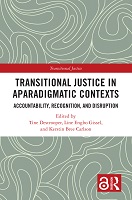Chapter Introduction
Proposal review
Transitional Justice in Aparadigmatic Contexts
| dc.contributor.author | Destrooper, Tine | |
| dc.contributor.author | Gissel, Line Engbo | |
| dc.contributor.author | Bree Carlson, Kerstin | |
| dc.date.accessioned | 2023-03-15T10:41:56Z | |
| dc.date.available | 2023-03-15T10:41:56Z | |
| dc.date.issued | 2023 | |
| dc.identifier.uri | https://library.oapen.org/handle/20.500.12657/61702 | |
| dc.description.abstract | Introduction: This introduction provides the rationale and theoretical anchoring for the volume and its focus on aparadigmatic cases. It argues that practice and scholarship in paradigmatic transitional justice contexts built a field that conceptualises the state as a partner in the transition. However, due to the field’s expansion to aparadigmatic justice contexts, this assumption and its associated binary concepts cannot inform analysis. Instead, as demonstrated by the present volume, transitional justice in aparadigmatic contexts offer different intentions, responses, and experiences of transitional justice. Where the state is not a partner, it may ignore, refuse, resist, and fight, while giving way to other actors and justice articulations. The chapter first conceptualizes transitional justice as the potential for recognition, accountability and disruption. The chapter then discusses the expansion and recent standardisation of the field, whereby transitional justice has become four specific types of mechanisms: trials, truth telling, reparation and institutional reform. Thereafter it analyses the problem of the state, particularly how the field has assumed a transitional state, a partnering state. In the next section it offers a typology of transitional justice contexts that cover both paradigmatic and aparadigmatic contexts and ranges from contexts of ongoing conflict to consolidated democracy in formerly imperial states. This range covers seven different types of transitional justice context organized on the basis of the status of its political authority. Lastly, it maps the volume’s chapters onto the typology and briefly introduces each of them. | en_US |
| dc.language | English | en_US |
| dc.subject.classification | thema EDItEUR::L Law::LB International law | en_US |
| dc.subject.classification | thema EDItEUR::G Reference, Information and Interdisciplinary subjects::GT Interdisciplinary studies::GTU Peace studies and conflict resolution | en_US |
| dc.subject.classification | thema EDItEUR::J Society and Social Sciences::JW Warfare and defence::JWX Other warfare and defence issues::JWXK War crimes | en_US |
| dc.subject.classification | thema EDItEUR::J Society and Social Sciences::JB Society and culture: general::JBF Social and ethical issues::JBFK Violence and abuse in society | en_US |
| dc.subject.classification | thema EDItEUR::L Law::LN Laws of specific jurisdictions and specific areas of law::LNF Criminal law: procedure and offences | en_US |
| dc.subject.classification | thema EDItEUR::J Society and Social Sciences::JK Social services and welfare, criminology::JKV Crime and criminology | en_US |
| dc.subject.other | Transitional Justice, Aparadigmatic Contexts, Transition | en_US |
| dc.title | Chapter Introduction | en_US |
| dc.title.alternative | Transitional Justice in Aparadigmatic Contexts | en_US |
| dc.type | chapter | |
| oapen.identifier.doi | 10.4324/9781003289104-1 | en_US |
| oapen.relation.isPublishedBy | 7b3c7b10-5b1e-40b3-860e-c6dd5197f0bb | en_US |
| oapen.relation.isPartOfBook | 6f09c5fc-0082-4107-964e-9b192b952e2a | en_US |
| oapen.relation.isFundedBy | 32a1d663-5833-4d1b-b1e6-4e191fb5c230 | en_US |
| oapen.relation.isbn | 9781032266176 | en_US |
| oapen.relation.isbn | 9781032266152 | en_US |
| oapen.imprint | Routledge | en_US |
| oapen.pages | 22 | en_US |
| oapen.remark.public | Imprint: Glasshouse | |
| peerreview.anonymity | Single-anonymised | |
| peerreview.id | bc80075c-96cc-4740-a9f3-a234bc2598f1 | |
| peerreview.open.review | No | |
| peerreview.publish.responsibility | Publisher | |
| peerreview.review.stage | Pre-publication | |
| peerreview.review.type | Proposal | |
| peerreview.reviewer.type | Internal editor | |
| peerreview.reviewer.type | External peer reviewer | |
| peerreview.title | Proposal review | |
| oapen.review.comments | Taylor & Francis open access titles are reviewed as a minimum at proposal stage by at least two external peer reviewers and an internal editor (additional reviews may be sought and additional content reviewed as required). |

